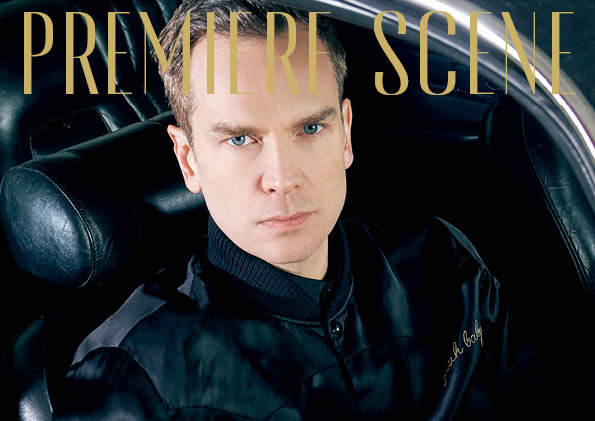
By Claire Bueno
I’ve had the pleasure of knowing Ali Cook for many, many years, he has worked tremendously hard and strives to hone his craft. When I was offered the opportunity to interview Ali, it was the ideal opportunity to catch-up, reflect on his career from his roots in stand-up and as an illusionist to becoming an actor. He’s one of those people you admire, so much about the world of entertainment is about perseverance, but that dogged determination has served the Yorkshireman well as he now stars as DCI Simmons in AMC/Alibi new crime, thriller Ragdoll, adapted from Daniel Cole’s best seller.
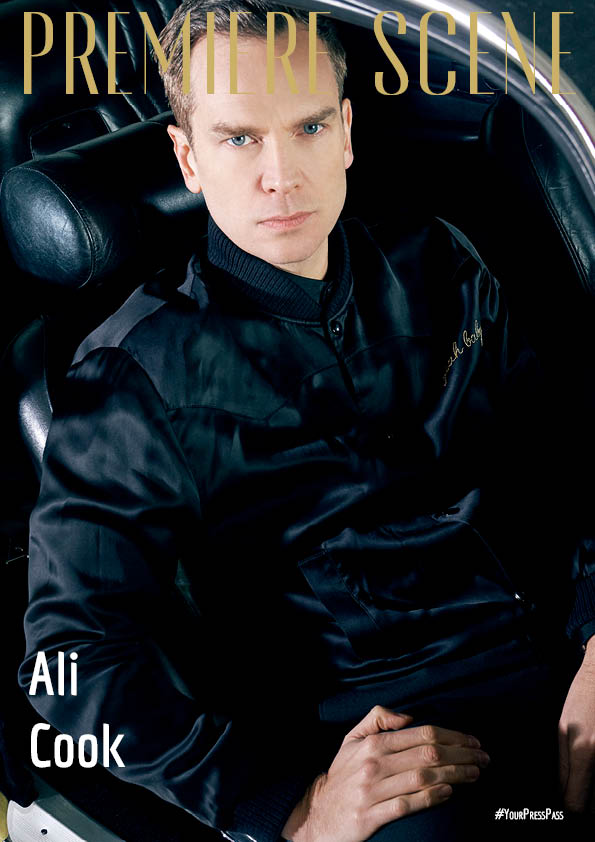
Ali, thank you for your time today and congratulations with Ragdoll. I've had the joy of seeing the first two episodes. It's a very complex story and I wondered whether you found that as well when you first read the script?
I did, yes, it's a complex story. I mean, what they did is they took a bestselling novel, which is essentially a very dark thriller by Daniel Cole. And then they got the screenplay written by Freddy Syborn, who is essentially a great comedy writer. So you've got this really interesting mix of sitcom moments and then what I would call dark thriller moments mashed together. So it makes for a very unique cross genre really.
Yeah, that's what I noticed, particularly in the first episode. You've got these characters bouncing off each other and then as we move into the second episode that’s dispersed with and it becomes much, much darker. So it's almost like the comedy helps gel the characters together?
They do a couple of things. With Thalissa (Teixeira) and Henry (Lloyd-Hughes), they have a constant banter going on, with jokes between them. Whereas the humour that comes out in my character is that my character is quite flawed and he always says the wrong thing at the right time. So it's much more like sitcom humour. But then all of that is interwoven with quite an intense plot which really is for people who don't know, they find a dead body which is actually made up of six different people, stitched together. And they have to find out who each one of those six victims are. And as they're doing it, the killer sends his list of his next six victims, which creates this huge ticking time clock of they gotta find out who the killer is.
Yeah, it really is very suspenseful and it's psychological as well, Henry's character, he's damaged, isn't he really? And there's a lot of psychological turmoil that you're having to work through with him?
Yes, that’s yet another element that they add. So they have what you might call the Bodyguard plot. Then you've got your sitcom moments with the banter with my character and Michael Smiley's character. And then you also have the True Detective moments of the Rose character having a breakdown all the way through.
Yeah, absolutely. And with regards to DCI Simmons, I did see him as very kind of goofy in the beginning. Is that is that how you saw him as well?
(Laughs) Well, Simmons. It was one of those auditions where it was a self-tape. So I had no idea. For people who aren't actors who might be listening what a self-tape is. You literally get sent a whole load of scenes, you have to film them on your phone and just interpret it how you think it is. And I found Simmons chillingly easy to do because, I'm a dad and I feel as though I'm like that with my kids (laughs). I say the worst thing all the time, and get angry at the drop of a hat because I'm totally out of control and I'm bluffing and I'm blagging and I'm completely incapable (laughs). And then Simmons is the same, he's the chief detective trying to keep in charge of these team of detectives who are clearly better and more talented than him. And he just can't handle it, basically. And to top that off with, he thinks he's funny, but he's not that funny, which is basically, if you’ve seen my stand-up act, you'd know exactly I find that very easy to pull off (laughs).
That’s an interesting question for you, really, because you have done stand up, you've done magic shows and comedy has been infused throughout your career. So how when you're performing comedy on a stage when you're on your own compare? Because so much of acting is reacting. How does the comedy differ in how you deliver it?
Oh, well, gosh, you could get me going for hours on this. These are the sort of things I lie up at night in bed discussing with myself for hours. But I think to cut a long story short, comedy is very hard to get right on screen because of the level of what they would call dry humour versus wet humour. Dry humour being like The Office. Wet humour being like Mrs Brown's Boys, where it’s highly exaggerated. And what level of exaggeration are you playing, in order to be convincing within the world the writer has created? And that's the real tricky part of any comedy, I think. And what's interesting I think with Ragdoll is they've managed to bridge that quite well, the serious drama moments with some humour. I would say as the one down from the leads, you have a bit more leeway to be a little bit more exaggerated a little bit, and you'll notice this in sitcoms as well. Quite often, the two leads are serious dramatic roles with the biggest themes, and then the secondary characters are more exaggerated. You see that in the Detectorists sitcom, very much so that the second and third characters down are more there to supply the humour, and quite often the reactions are coming off of the leads reacting to these flawed characters.
Interestingly enough, I'm going to mention Ghostbusters as we’ve got Afterlife coming out. But there's a prime example of what you're saying that you've got three comic actors Dan Aykroyd, Bill Murray and Harold Ramis and surrounding them are all theatre actors, Ernie Hudson, Sigourney Weaver. These are all straight playing actors, they don't have to be funny because the three leads are; it's kind of the same thing, isn't it?
Yeah it is. And I think sometimes what happens in stand-up comedy, it’s not always the case because you can go on for hours. But quite often in stand-up you’re the normal guy observing these ridiculous things within the world, whereas in character comedy, within a script, the joke is that your perspective is so flawed. For example, there's a great bit with Simmons where, in one of the episodes, I talk about how women never get a chance in the world, and yet all I do throughout the whole series is shout at the two women who work for me (laughs). So there's all these inherent hypocrisies that are just revealed instead of being telling a joke, it's just revealing the behaviour. So I guess that's the main difference between stand up in a scripted comedy.
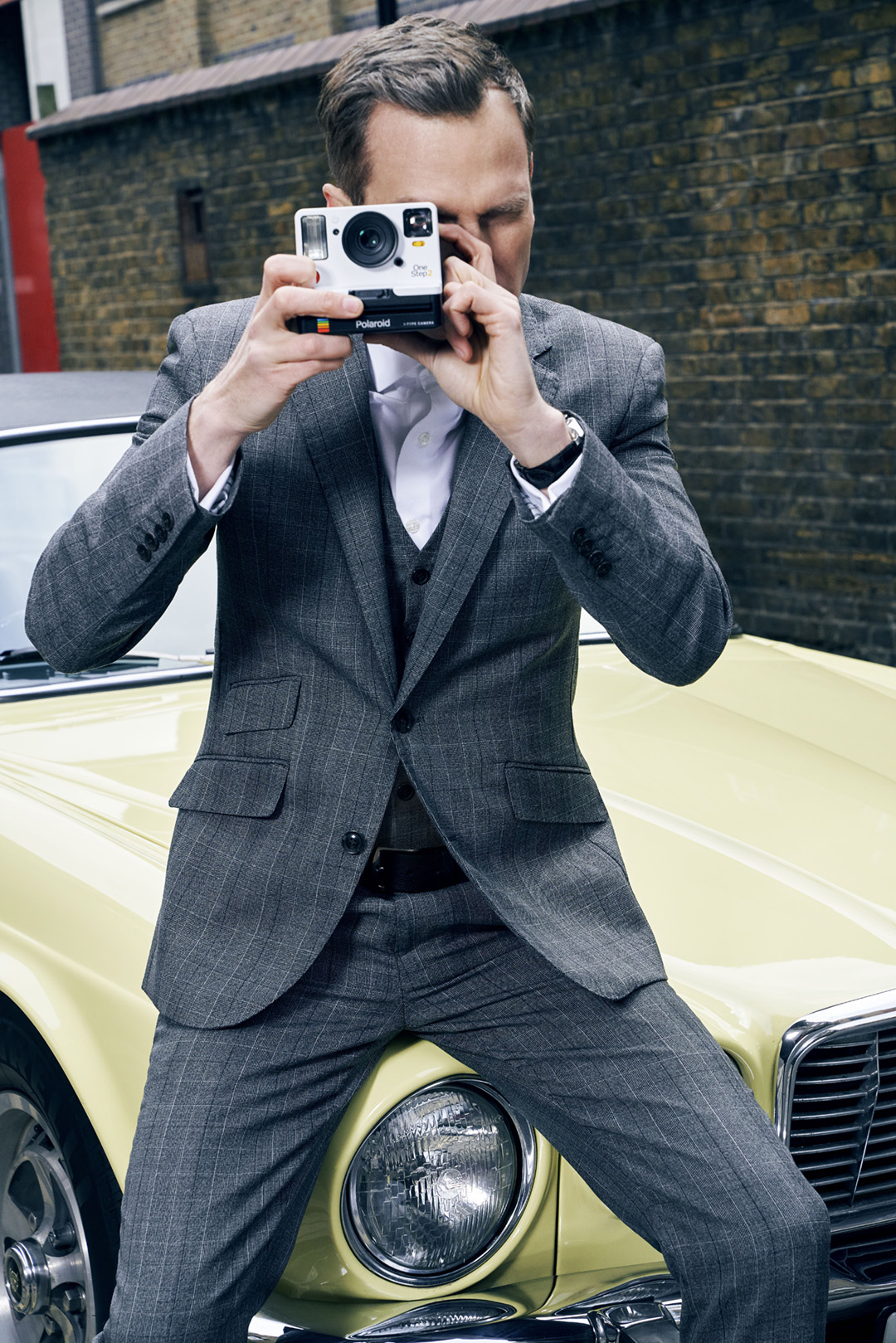
“I actually quite like playing the fool.”
Yeah. And I imagine as well for you as an actor, that's your job. So it's already there in the script and it's your job then to bring that to life?
Yeah, I actually quite like playing the fool, so I quite enjoy it, I enjoy it more. If someone said to me, you can play the romantic lead or you could play David Brent, I would much prefer to be David Brent, I think (laughs). It depends what you naturally want to do, but that for me, I don't know, is easier to do and more fun in a way (laughs).
Because of that, the kind of the background that you've come from. What made you want to transition into acting because you're very successful in the career that you had? What was it about acting for you that made you think, Okay, I'm going to change my career path?
Yeah, well, I still perform in comedy clubs all the time, and I feel as though to do comedy acting you have to. For some reason you get funnier, even though you're writing jokes, but you just inherently get funnier the more you're on a comedy stage and there's no other way to practice that other than to do it. So I do perform gigs, little gigs all the time between acting roles. But for me, I was performing at the Comedy Café, which used to be in East London, and the young director called Andrew Saunders saw me and he asked me to be in his short film. And he was at the NFTS at the time, and I made this short film and he was being mentored by Stephen Frears, I had no idea who Stephen Frears was, I met Stephen Frears for two or three days, I was being directed by him. I just thought, oh, it's just an old bloke with a beard, I had no idea (laughs). And I was like, God this is good, these guys really know what they're all about. This is like, really interesting. And I think the short film because my very first experience was so good, I thought, wow, this is so exciting. And I think one of the other things that I quite enjoy about acting is, I think performing live is a very lonely business. I've been driving up and down motorways for hours on end. You then get out your car, do a show for 20 minutes, get back in the car and drive home. And whereas acting, you're essentially in a team. So I think that's what I enjoy about that as well.
And you’re somebody that's constantly working or it feels like you are because I always see on social media, or I'm interviewing you for it. What’s your approach to choosing scripts? Especially when you were emerging. Do you just take what you're offered? Or do you do you have to start by being selective? I'm trying to inspire other people who also want to become actors.
Yeah, that's a good question. I think I heard Michael Caine say this, but don't quote me, that he just used to take every job because your job is to get better at acting. And I see it a little bit when I do live gigs. I was lucky enough to do a West End show. But the West End show seemed easy because I've done twelve years of crappy gigs all around the country and when you can entertain eight builders in Hull, then performing at the Noel Coward is not a problem, in fact, it's a lot easier. And feel like that with acting. If you can get something out of a script that's not brilliant. When you finally do get the opportunity to work on a great script, you sort of develop these chops from just doing it a lot.
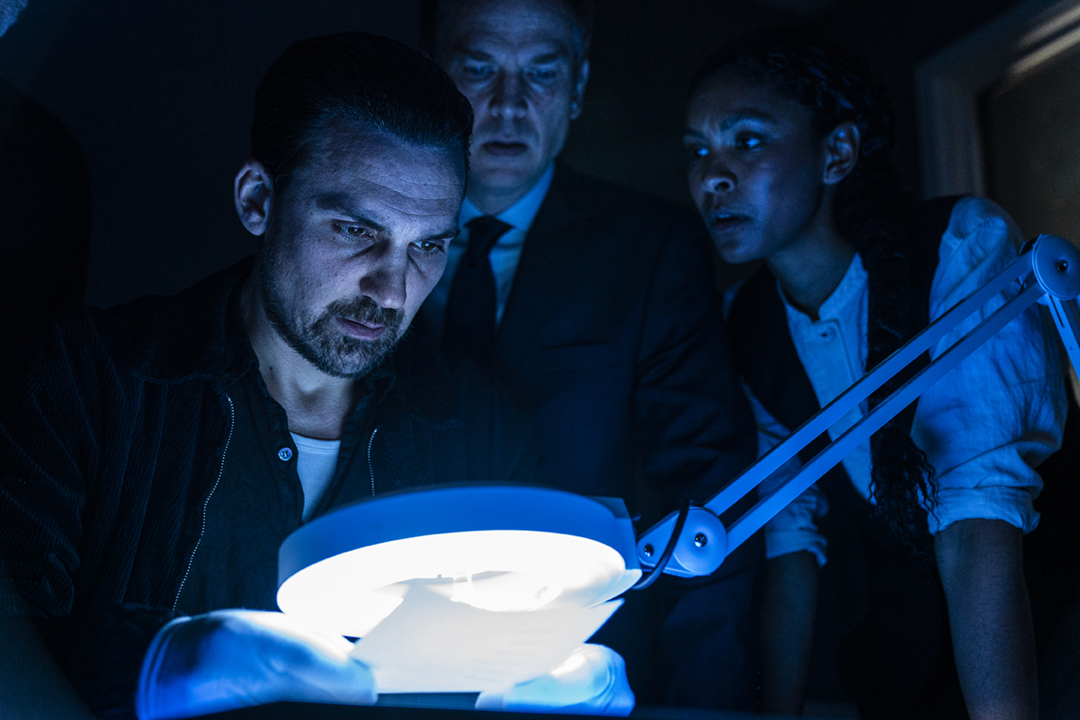
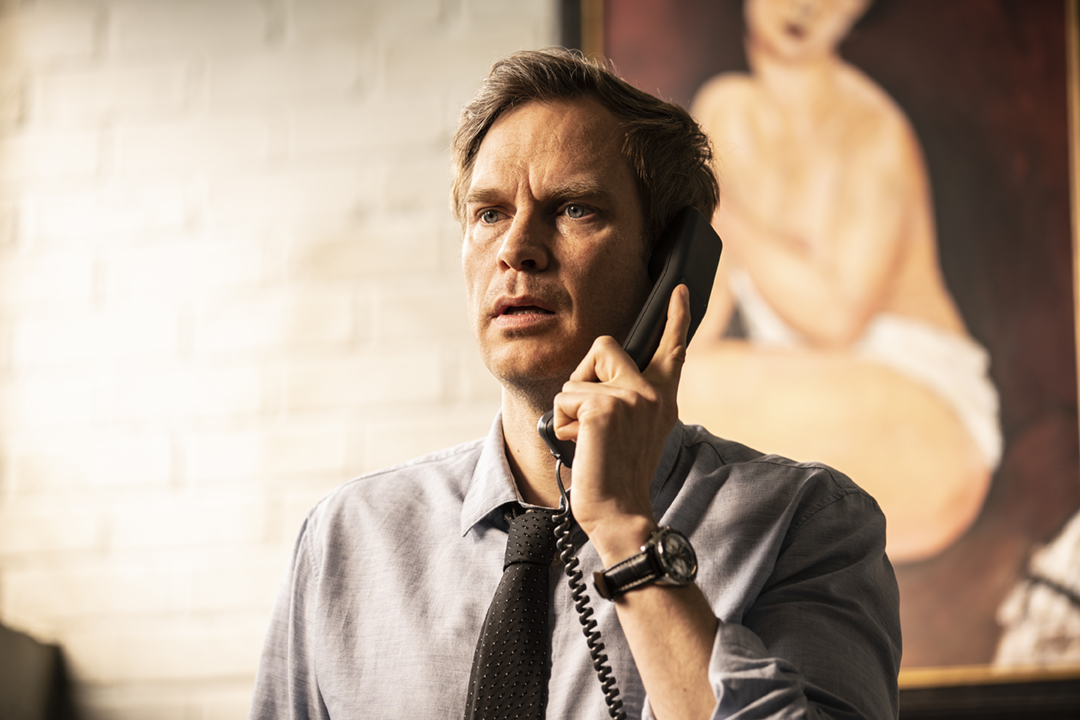
And going back to Ragdoll. You said already that it's based on a book. Did you read the book?
I'm one of these people that once to get something. I get completely obsessed with it, and I want to know everything. And I started to read the book and then I stopped myself because I just thought, if I know everything, I was too worried that I'd give and informed performance. So I actually didn't want to know who the killer was.
With regards to working on Ragdoll, what do you think you've taken away with you from working on it? And what will you use to help you move forward?
Well, I think it's the first time I've done so much, so quickly, I've never done a six part series before. Prior to that, I've done three episodes in a series, but usually quite spread out. So I think it's the ability to learn intensely under pressure, all of your lines and then just really going for it as well. I think probably one of the hardest thing with acting is when all the attention is on you, and there's this crew of 30 people around you, that just being willing to really do something crazy and not be frightened to do it. If you are suddenly going to shout at someone or suddenly burst into tears, to really let go and go for it. And the great thing about doing a six part series is by the time you’ve done episode one you’re so in the groove that you're just doing it and it just gives a new level of confidence, I think.
ALI COOK stars in RAGDOLL airing on AMC and from 6TH DECEMBER on Alibi
Credits
Photographer: Diana Gomez Production Stills: Sid Gentle Films/Alibi
With special thanks to Epilgoue
Claire Bueno
Claire Bueno is a film journalist, presenter and interviewer, having moderated BAFTA, Royal Television Society (RTS), Women in Film and Television (WFTV), and Apple Store Q&As and hosted Comic Con panel talks. Claire is the founder of Premiere Scene Magazine and has had the privilege of interviewing esteemed artists including Tom Cruise, George Clooney, Brad Pitt, Sir Anthony Hopkins, Sigourney Weaver, Emily Blunt, Samuel L Jackson, James Cameron and Andy Serkis.
As a media coach Claire works with leading personal publicists, HBO, Netflix, Sky, ITV, Penguin Random House, the BFI, DDA, MacMillan and Premier, offering practical coaching sessions and safe environment for talent to perfect their interview technique before facing the press. She has extensive experience working with emerging and seasoned professionals and where English is not their first language.
Additionally, Claire is the producer of the critically acclaimed feature documentary CLEANIN’ UP THE TOWN: Remembering Ghostbusters and the upcoming TOO HOT TO HANDLE: Remembering Ghostbusters II.
